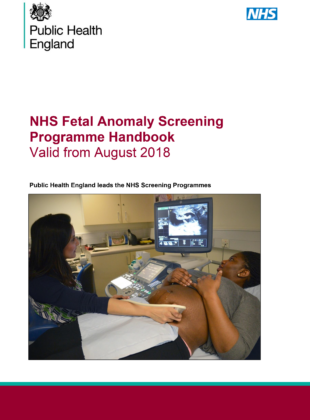We have updated our national guidance for healthcare professionals who provide fetal anomaly screening services.
The NHS Fetal Anomaly Screening Programme (FASP) handbook and the FASP handbook for laboratories help make sure services meet national standards.
Both updated handbooks feature executive summaries which give a quick overview of the contents. We have updated the glossaries and embedded links to related information throughout, making the documents simpler to navigate and shorter than their predecessors. We have also used plain English principles to make them easier to read.
In both handbooks, we have:
- used the word ‘chance’ rather than ‘risk’ throughout
- updated information regarding Down’s syndrome, Edwards’ syndrome and Patau’s syndrome following work undertaken with the Down’s Syndrome Association, Down Syndrome Research Foundation and Support Organisation for Trisomy 13/18
- removed duplications of information that is included in other documents
- included links to the PHE twitter account and PHE Screening blog
Programme handbook

The updated programme handbook includes up-to-date data on miscarriage rates following diagnostic testing.
We have clarified guidance regarding the QF-PCR (quantitative fluorescence-polymerase chain reaction) laboratory technique result from a chorionic villus sample (CVS) diagnostic test which indicates a baby may be affected by Down’s syndrome, Edwards’ syndrome or Patau’s syndrome.
We now recommend that the culture result should be used to confirm the QF-PCR result before any decisions are made regarding ongoing care or termination of the pregnancy.
The updated handbook also includes:
- improved links to the National Congenital Anomaly and Rare Disease Registration Service (NCARDRS)
- a short section on non-invasive prenatal testing (NIPT)
- enhanced information on FASP key performance indicators (KPI) FA1, FA2 and FA3
Handbook for laboratories
The biggest update to the handbook for laboratories is the addition of information about the UK Accreditation Service (UKAS).
UKAS is the UK’s national accreditation body responsible for assuring the technical competence and integrity of laboratories that offer testing, calibration and certification services comply with set standards.
Medical laboratory accreditation (ISO 15189) is a particularly important standard for fetal anomaly screening.
Other updates to the handbook for laboratories include:
- the addition of NCARDRS reporting
- an updated section on specimen transport and storage
- an expanded section on the screening quality assurance service SQAS and UKAS
- an updated education and training section
- the inclusion of NHS FASP standards relevant to laboratories
- template letters for lower chance results
Please send any queries, suggestions or feedback about the updated handbooks to the PHE Screening helpdesk.
PHE Screening blogs
PHE Screening blogs provide up to date news from all NHS screening programmes. You can register to receive updates direct to your inbox, so there’s no need to keep checking for new blogs.